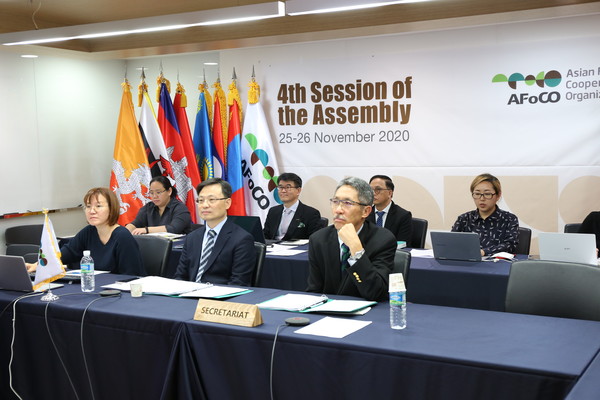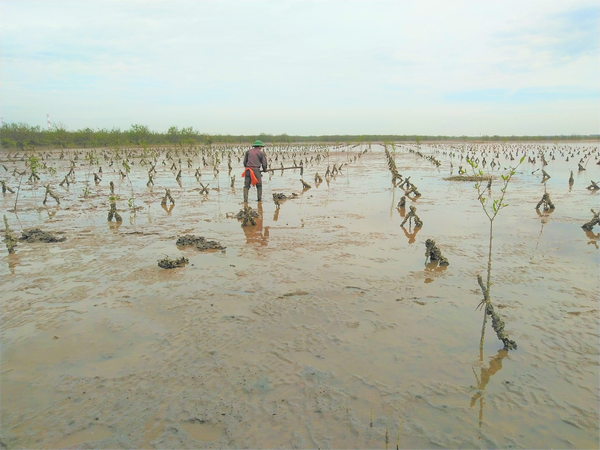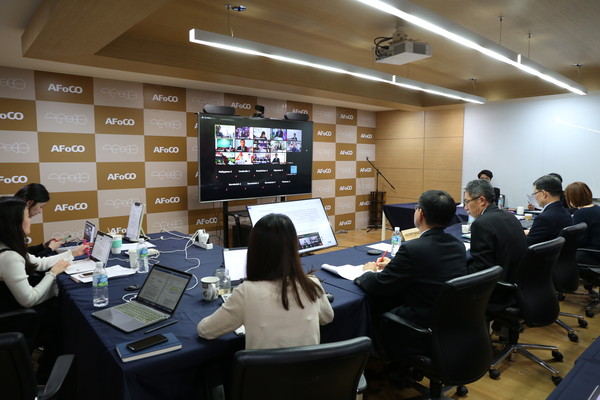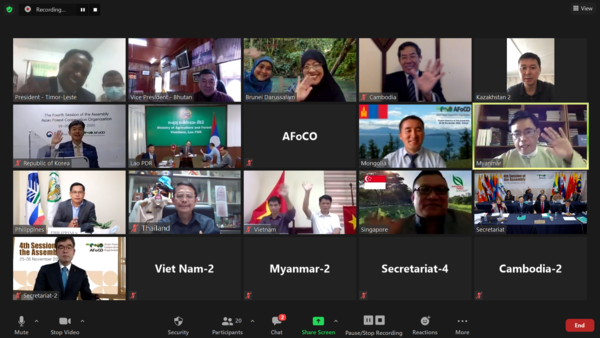By Feature Editor Kim Hyung-dae


Korea Forest Service (KFS) plans to participate in international joint efforts to maximize the role of responding to climate and environmental crises through forests in Asia, in line with the “UN Ecosystem Restoration 10-Year Plan” starting in 2021.
“There is an answer in the forest. Cooperation initiatives among Asian countries are very important to break through the climate and environmental crisis,” said Korea Forest Service Minister Park Jong-ho.
“KFS will rediscover the role of forests in the crisis faced by mankind such as COVID-19 and climate crisis. As a result, action-oriented cooperation and crisis response between Korea and Asian countries through the Asian Forest Cooperation Organization (AFoCO) are necessary,” he said.
The AFoCO is an intergovernmental international organization established to effectively respond to the climate crisis through the establishment of sustainable forest management (SFM), and 15 member countries, including Korea and ASEAN member countries, are participating.
The 13 member states are Bhutan, Brunei, Cambodia, Indonesia, Laos, Kazakhstan, Mongolia, Myanmar, Philippines, Korea, Thailand, Timor-Leste and Vietnam, and the observer countries are Malaysia and Singapore.

AFoCO’s five-year strategic plan ('19∼'23) include ① Creation of customized forest restoration and restoration models ② Support for research and development in the field of adaptation to climate change ③ Introduction of systematic forest disaster management measures ④ Local Livelihood improvement and community-based small enterprise development ⑤ Strengthening institutional capabilities, diversifying resources & promoting regional actions.
AFoCO seeks advancing toward global cooperation by joining the UN General Assembly observer and tries to contribute to forests in Asia for better and greener reconstruction in the post-COVID-19 era.
Korea Forest Service plans to rediscover the hopes and possibilities that the restoration of damaged forests in Asia and the conservation of forest ecosystems throw on humanity facing a survival crisis.
It also examines the efforts and achievements of the Asian Forest Cooperation Organization to resolve the climate and environmental crisis, and the future tasks of international cooperation in the forest sector.

○ Message from the forest to humanity in the crisis of survival
The fundamental and direct cause of the outbreak and spread of infectious diseases has been found to be the increase in contact between wild animals and humans due to damage to the forest ecosystem and the spread of viruses that were dormant in the wild due to climate warming.
According to the UNEP data in 2020, one-third of new infectious diseases such as COVID-19, AIDS, and MERS originated from forest damage. When 1㎢ of forest area is damaged, the number of malaria cases increases by 27 on average due to intermediate-spreading phenomenon.

About 12 percent of global carbon emissions are caused by deforestation, of which 25 percent is known to be caused by wildfires.
In 1997, forest fires in the peatlands of Indonesia emit carbon dioxide equivalent to 40 percent% of the world's annual average carbon emissions (some 2.6 billion tons).
The expansion of carbon sinks through forests is the most cost-effective and quick way to respond to climate change.
○ Action-oriented international cooperation in forestry led by Asian countries
Asian Forest Cooperation Organization (AFoCO), an intergovernmental international organization, was established to promote sustainable development and response to climate change through forest cooperation.
A proposal was made at the ASEAN-Korea Special Summit in 2009, and the AFoCO was established as an intergovernmental organization in which 15 Asian countries participate in 2018.
Geographically, not only Southeast Asia, but also Central Asia, Northeast Asia, and Southwest Asia are covered, thus it is playing a role as a practical center point for forest cooperation in Asia.
The AFoCO plans to strategically expand the scope of member countries in the future to diversify financial resources and expand the organization's influence in international cooperation on climate change.
By introducing and applying proven policies and technologies, the AFoCO has been contributing to climate change reduction by restoring damaged forests in developing countries and preventing deforestation, contributing to sustainable development by improving the poverty problem in mountain villages and spreading sustainable forestry.
Korea Forest Service has been contributing to poverty improvement through expansion of forest carbon sinks, reduction of forest disasters caused by climate change, and improvement of income of residents in mountain villages through forest cooperation projects in Asian developing countries.
In December 2020, AFoCO acquired the status of observer at the 75th United Nations General Assembly.
Accordingly, KFS has been pushing ahead with implementation of the UN's three major environmental conventions (climate change, biodiversity, and prevention of desertification), the UN Forest Forum (UNFF), and the High-Level Political Forum for Sustainable Development (UN HLPF), etc.
KFS is moving to participate in international joint efforts to maximize the role of responding to climate and environmental crises through forests in Asia, in line with the “UN Ecosystem Restoration 10-Year Plan” starting in 2021.
○ Better and greener reconstruction in the post-COVID-19 era through forests
Now global cooperation is required to respond to the more destructive climate crisis than COVID-19.
Prof. Jared Mason Diamond, an American geographer, historian, and anthropologist, said that COVID-19 is spreading globally, but it is mild compared to the three problems that are slowly killing mankind – climate change, resource depletion, and social inequality.
Meanwhile, UN Secretary-General António Guterres said, “I ask each country to declare a “climate emergency” until it reaches a state of carbon neutrality.”
“As a result, investment and cooperation in the forest sector can lead to a more sustainable, inclusive and safe post-COVID-19 era,” an official of KFS said.
“Compared to the economic losses caused by the outbreak of infectious diseases, the investment to reduce deforestation is a cost-effective and smart choice. Restoration of damaged forests is the fastest and most cost-effective investment in climate warming and can contribute to the economy through new business opportunities and employment,” he said.
“Healthy forests provide livelihoods and safety nets for the world's poor class and promote inclusive development,” he added.

